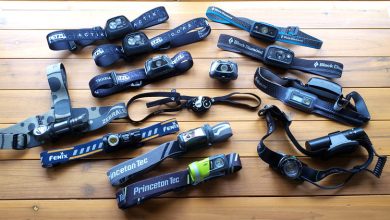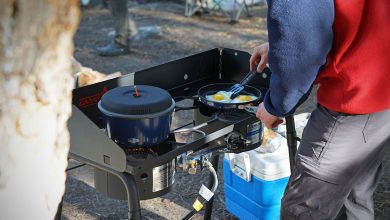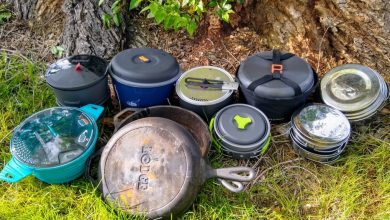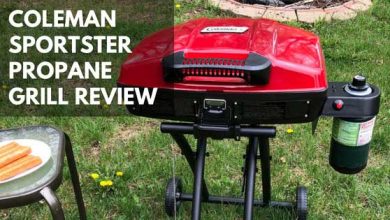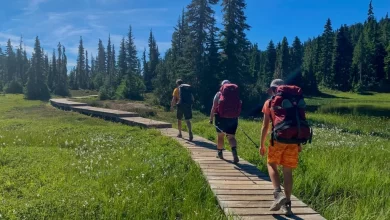Sleeping Outdoors – Sleeping Tips for Camping
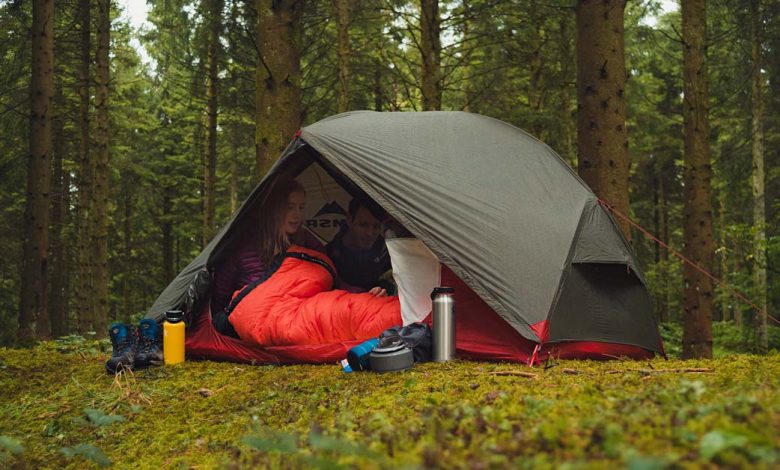
How can you increase your odds of a sound night’s sleep when sleeping outdoors during a camping or backpacking trip?
To start with, you will need sufficient cushioning, like a mattress or stretcher, to protect you from the cold ground when sleeping.
Other Sleeping Aids
- You can stuff a pillow case with some clothes if you don’t have ample space for a pillow, or you can bring one from home or invest in a camping pillow.
- Eyeshades are nice to have but not a necessity.
- Earplugs can help to cancel out any unwanted noises ensuring for a good night’s rest. Especially when you need a good night to rest on adventure trips.
- Camping hammock is ideal for taking naps.
- Most importantly, a light source such as a flashlight, lantern or headlamp.
There are also smaller mental and action things you can do during the night for a better night’s sleep. This article will provide you with a wide range of tried and tested advice.
Adapting to Sleeping Outdoors
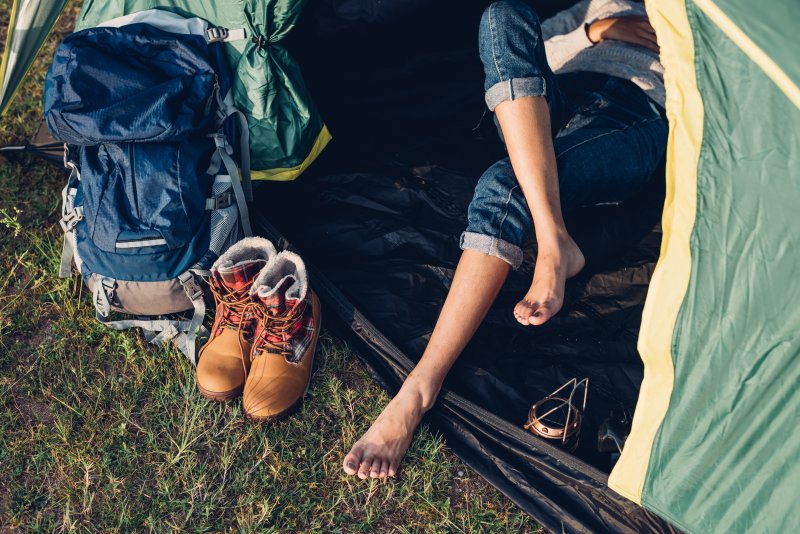
Always avoid placing your tent on roots, rocks or debris; it should be placed on a flat surface that is obstacle-free.
The joy of the experience of camping will override any inconvenience, even when you have to walk 6 campsites down to visit the loo, or don’t have to comfort of your own bed. Prepare yourself mentally for new surroundings and embrace the experience.
Prepare yourself for the changes you may encounter when in the “wild” like the nights being much darker than in urban areas, as well as the temperatures dropping quite low in comparison to where you stay. Layer your clothing and if you know about the climate of where you will stay, you can even invest in some thermal clothing. Also, hang an LED lantern inside your tent as soon as you have set up so you know it is there should it become dark.
Buying a tent is also a key factor before going camping, so it is needed that you read here before you go out buying a tent.
Before Bed
Inquire about the rules of where you should store your food as not all parks have the same rules concerning this. Never be sloppy with food and never store it inside of your tent. Do not brush your teeth in the wild, and there are ablution facilities for this as it may lure wild animals and scare away neighbors. Remember, wild animals are attracted by the scent of your food, so make sure they don’t come sniffing in your tent for food, especially when you are still sleeping in that tent.
To ensure some normality in your otherwise new surrounding, keep to some form of routine. If you brushed your teeth before bed, do that as well at the campsite.
If your clothes are damp or sweaty, hang them out to dry overnight and wear comfortable sleepwear to bed. It will keep you warm and relaxed and avoid oil transfer from your body to your bag.
Tip: Use a sleeping bag liner on the inside of your bag to keep it clean and tidy.
Do not overdress before getting in your bag as bulky clothing can reduce heat and the bag won’t be effective in trapping body heat. Rather layer a jacket or blanket over your bag for extra insulation.
Tip: Bring a familiar bedding item from home to serve as an extra layer, something like an old comforter or blanket.
When you know the area will be much cooler at night than at home, you can eat a small snack before bed, as this will generate heat while you sleep due to the digestion process.
Do a bit of exercise like 5 or 10 sit-ups before bed. Just enough to heat your body without becoming sweaty or wide awake.
Drink water, not too much, though, but keep hydrated to aid in blood circulation. This will also diminish the possibility of a headache when you camp in higher altitudes.
Wear a beanie when you go to bed with your entire body zipped up inside of your bag. Your head and face are the first places that will lose heat.
Overnight
Don’t listen to the night sounds too closely if you get spooked easily; rather, wear earplugs or earmuffs. The woods can be full of weird sounds, and what you might think is a wild animal can turn out to be a tree, but it will keep you awake if you lie and listen to it. Wild animals may wander into the camp from time to time, but generally, they are more scared of you than you need be of them.
Tip: Try camping near moving water if night sounds really unnerve you as the water rushing can make for very relaxing ambient sounds.
Place a light by the end of your bed or beside your bed on top of a pair of sandals or camp shoes in case you need to make a late-night restroom trip. Also, keep a water bottle next to your bed in case you get thirsty.
If time permits, you should always air out your bag in the morning. As this can remove any moisture that accumulated overnight.
Sleeping Outdoors and Temperature Extremes
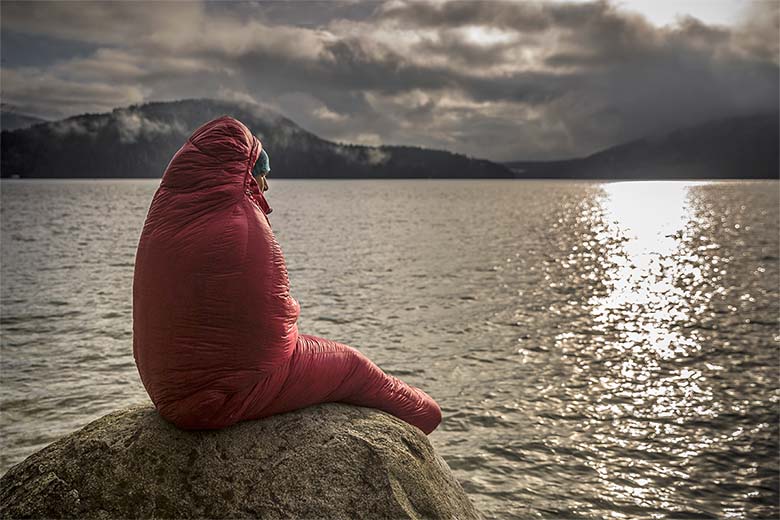
On warm nights you might not even need a sleeping bag. Bring a blanket from home that is light yet warm enough to just drape over you.
Here is a list of tips and pointers for extra cold nights
- Wear socks and long underwear to bed.
- Wear a beanie or a hat.
- Clinch the hood of your bag (if it has one) around your head and just leave an opening big enough so you can still breathe by your mouth and nose.
- You can add a foam pad or two underneath your sleeping bag.
- To reduce the area, your body must heat up, and you can stuff dry clothing into all the empty spaces.
- Sleep with a warm water bottle close to the core of your body.
- Avoid drinking alcohol before bed as this can spur heat loss by dilating the blood vessels. Rather drink a beverage that delivers physical and psychological benefits such as a hot chocolate drink or a glass of warm milk.
- Do a little exercise before bed, but not to the extent that it keeps you awake or makes you sweat.
- Make a nice campfire to warm up your body and the surrounding area.
Sleeping Outdoors can be great fun for the whole family. But, you need to know some basic Camping Safety before to keep yourself and your family safe and happy. To learn what you need, it is important that you read this page very carefully.
